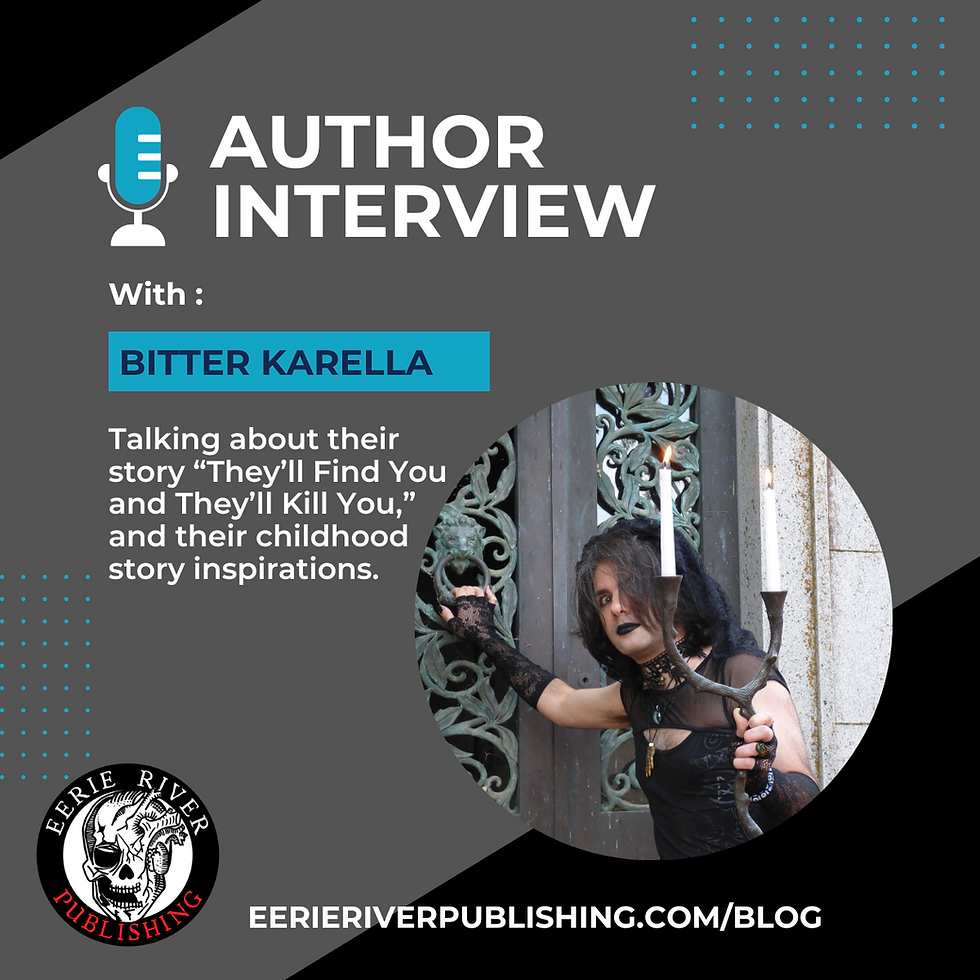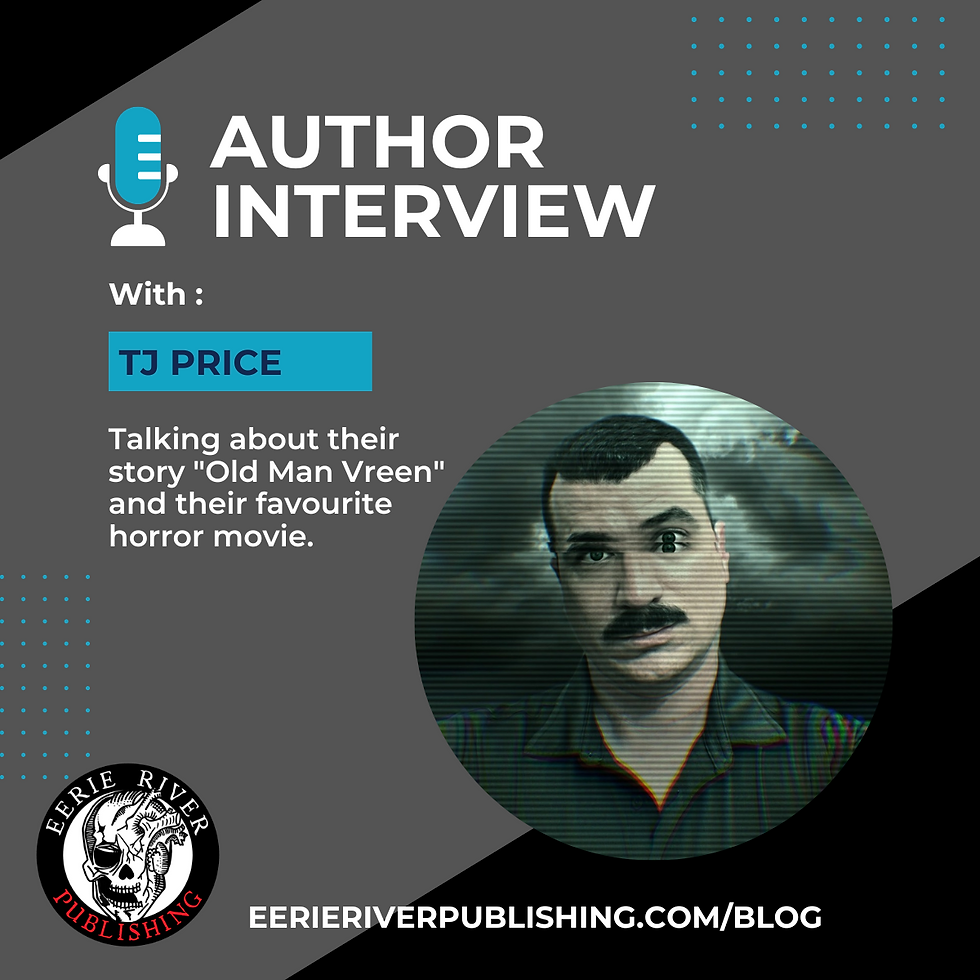Eerie Pride: Highlighting S.O. Green
- Eerie River

- Jun 13, 2021
- 4 min read
Thank you so much for sitting down with us for PRIDE month!
So, tell us a little bit about you. How did you get into writing?
I am Simone. I usually go by they/them. I am blessed with two supportive partners who have stood by me throughout this crazy journey thus far, and who push me to go further every day. I write. I have always written. You can find my work in anthologies by Eerie River Publishing, Dragon Soul Press and Black Hare Press to name just a few. I’m also Eerie River’s current contract editor, working with such amazing authors as David Green and T.M. Brown.
I originally wrote fan fiction, which I credit as the whetstone I used to hone my craft. A few years ago, I transitioned to commissioned writing, which was quite lucrative but limited. From there, I made the jump to short fiction anthologies. I’m hoping to break the novel barrier within the next year, but I’m enjoying myself and I’m in no rush. The editing is a new and exciting aspect of it. I love creating my own universes, but it’s great helping other people build and refine theirs.
As an author do you intentionally try to represent LGBTQIA2S+ characters in your stories?
Without a doubt. I try to write a broad range of characters across a number of spectrums. Representation of these characters has been historically poor, and I think it’s important to normalise these lifestyles, shed light on the hardships and celebrate the triumphs. My aim is always to provide an interesting, kind-hearted main character in an exciting, entertaining plot. I want people to come away feeling good about what they’ve read, and the person they’ve read about, no matter what that person’s orientation might be. Horror presents the reverse of that, in that I’m trying to evoke sympathy for the main character because of all the terrible things that are happening to them.
What are your favourite genres to read and write?
I love genre fiction overall, and I’m probably never too far away from trying my hand at a new sub-genre. I’ve written horror, sci-fi, fantasy, romance, crime, even a Western at one point. I’m the same with reading. Anything with an interesting hook, a nice main character and lots of stuff happening will get my interest. Unfortunately, that means I can’t really stand literary fiction. It does mean that I’m writing a lot of LGBTQIA2S+ characters into genres where they aren’t often seen.
As a society we have come a long way in representation of LGBTQIA2S+ members, but there is still a long way to go. What would you like to see happen in the next few years and how do we get there in order to see that representation?
There are a great many stories that need to be brought to light within the LGBTQIA2S+ community; stories of people rising against prejudice or flourishing despite adversity, or finding support in unexpected quarters of their lives. These stories are powerful and putting them out for others to find are how we build bridges between perspectives. It’s a way for people to build both empathy and sympathy for each other and that is so valuable.
My primary concern is for the normalisation of LGBTQIA2S+ lifestyles. I want to see more examples in the media of characters who are fully accepted and integrated into their families and communities, because this is the blueprint for the world we should be living in—a world where everyone is judged on the strength of their character and free to love whoever they wish, so long as the love is true.
More than anything, I want to see kindness and tolerance as the norm in society as a whole. If we’re going to flourish, I don’t see there being room for anything else.
Tell us about the first piece of writing you had published and how that impacted you?
My first publishing credit was actually an urban fantasy piece about a gay werewolf private detective partnering with a lesbian sin eater to solve the murder of a succubus. I still love the story, but I’ve come such a long way since then. I think it was probably the first time I realised that, actually, my work might have been good enough to catch people’s attention.
The real turning point for me came in 2020, with my first acceptances to Dragon Soul Press (The Stolen Queen, soon to be reprinted), Black Hare Press (Sex-Type Thing, an archetypal story for me) and Eerie River Publishing (Married to Nightmares, my first contest win with Eerie), which have led me to meet great authors, participate in and lead group projects, and even become an editor. Crazy to think they were all just last year.
It’s almost cliché that authors live on black coffee and hard liquor. What are you drinking right now?
Green tea. I never touch coffee or alcohol. I’m quite conscious of my health, which is why I eat plant-based and exercise a lot. Specifically, I train to kill things with my bare hands. That’s probably another way I break the cliché.
Any advice for young authors beginning their author journey?
Don’t write for the money. There are a lot of other jobs that pay better, are easier and more secure, than writing. Other than that, get yourself a burner project to practice your craft/get your writing brain engaged. Your overall productivity will go up and up and up, and you may find yourself planting seeds for other projects that you will publish.
And, finally, give yourself five years. If you assume it’ll take you five years minimum to make real progress, you’ll be amazed how much progress you’ll make in only one.





Comments